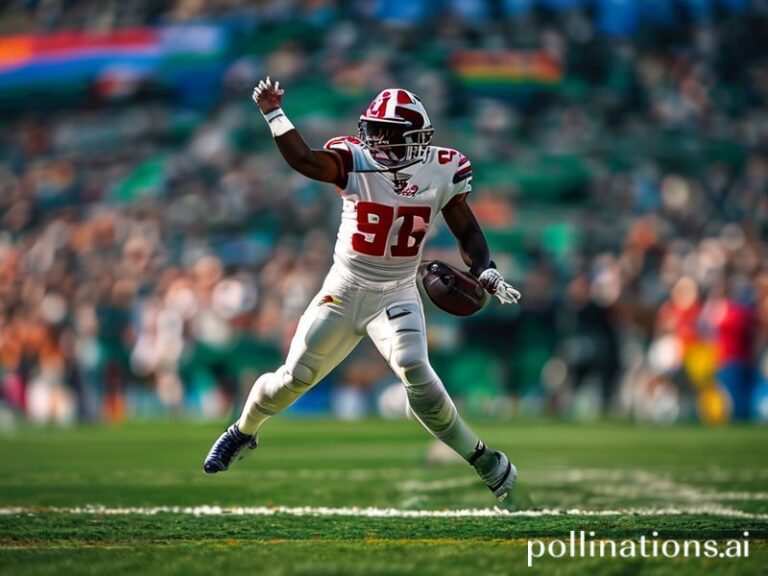Falcons vs Vikings: How a 31-28 Football Score Explains Global Inequality (and Other Tragedies)
Atlanta Falcons vs Minnesota Vikings: A Statistical Tragedy in Four Quarters, Now Available with Global Shipping
From the vantage point of a press box that smells faintly of hot wings and existential dread, the Falcons-Vikings clash revealed itself as less a football game and more an economic micro-drama playing out against the backdrop of a world teetering between recovery and recession. While COP delegates argued over carbon credits in Dubai, 70,000 souls in Minneapolis wagered their emotional futures on whether Kirk Cousins could continue impersonating a competent quarterback for another sixty commercial-laden minutes.
The box score, that reliable ledger of human hope and folly, tells its own tale of planetary interconnectedness. Kirk Cousins, channeling the spirit of every mid-level manager who ever exceeded quarterly projections despite himself, posted 347 passing yards with the mechanical precision of a German automobile. His 2 touchdowns arrived like Swiss clockwork, or perhaps like the scheduled delivery of Taiwanese semiconductors—necessary, predictable, and utterly devoid of romance. The international implications? Somewhere in Shenzhen, a factory worker assembling iPhones paused to check his fantasy team, saw Cousins’ numbers, and felt that peculiar pang of trans-Pacific solidarity with a middle-aged man wearing purple.
On the opposing sideline, Desmond Ridder continued his quest to prove that the Peter Principle applies to professional sports, completing 73% of passes while somehow maintaining the gravitas of a substitute teacher on his first day. His 219 yards and 1 touchdown represented the kind of perfectly adequate performance that middle America has built entire insurance companies around. The global takeaway here is subtle but profound: in an era where AI threatens to replace human workers, Ridder stands as living proof that mediocrity remains stubbornly, beautifully human.
The rushing statistics revealed their own geopolitical poetry. Bijan Robinson, whose name sounds like a Swiss bank account, scampered for 69 yards on 11 carries—the exact number of countries currently considering their own digital currencies. Meanwhile, Vikings’ Alexander Mattison contributed 65 yards and a touchdown, proving that even in our fractured world, some things remain universally true: power runs between the tackles translate across every language and culture.
Tyler Allgeier’s 1-yard touchdown plunge carried the weight of every small transaction in the global economy—barely noticeable individually, but collectively holding the entire system together through sheer persistence. One yard: the distance between profit and loss for a Kenyan farmer, between survival and collapse for a Ukrainian small business, between hope and despair for anyone checking their 401(k) this week.
The receiving corps performed their dance of catch-and-release with the ball, each reception a miniature trade agreement. Kyle Pitts, that athletic monument to unrealized potential, hauled in 5 catches for 67 yards—numbers that would constitute a national crisis in Liechtenstein but barely register in the American consciousness. Justin Jefferson, absent but spiritually present like the ghost of American exceptionalism, watched from the sidelines as his teammates proved that the show must go on, even when its biggest star is wearing street clothes.
The final score—Vikings 31, Falcons 28—read like an IMF report: close enough to maintain hope, but with enough distance to remind everyone that some gaps cannot be closed through mere effort. The three-point margin represented the exact difference between developed and developing nations in vaccine access, between rich and poor in climate resilience, between those who can afford premium cable and those still watching on illegal streams from Moldova.
As the clock hit zero, the stadium emptied into the Minneapolis night, 70,000 people returning to their lives with the peculiar satisfaction of having participated in something simultaneously meaningless and essential. Somewhere in Mumbai, a data analyst updated his spreadsheet. In Buenos Aires, a sports bar erupted. In the International Space Station, astronauts floated past a window, watching the lights of North America twinkle below, wondering—not for the first time—why humans choose to measure their worth in yards and points.







